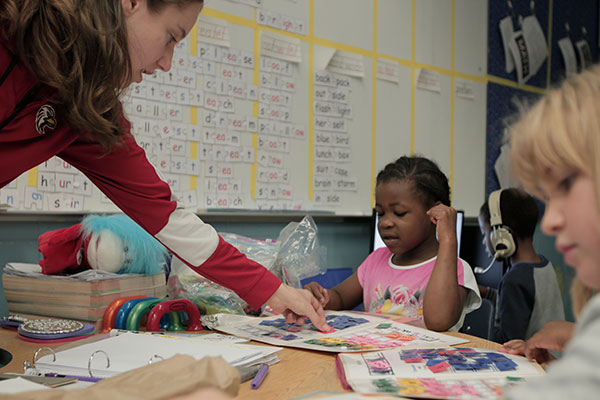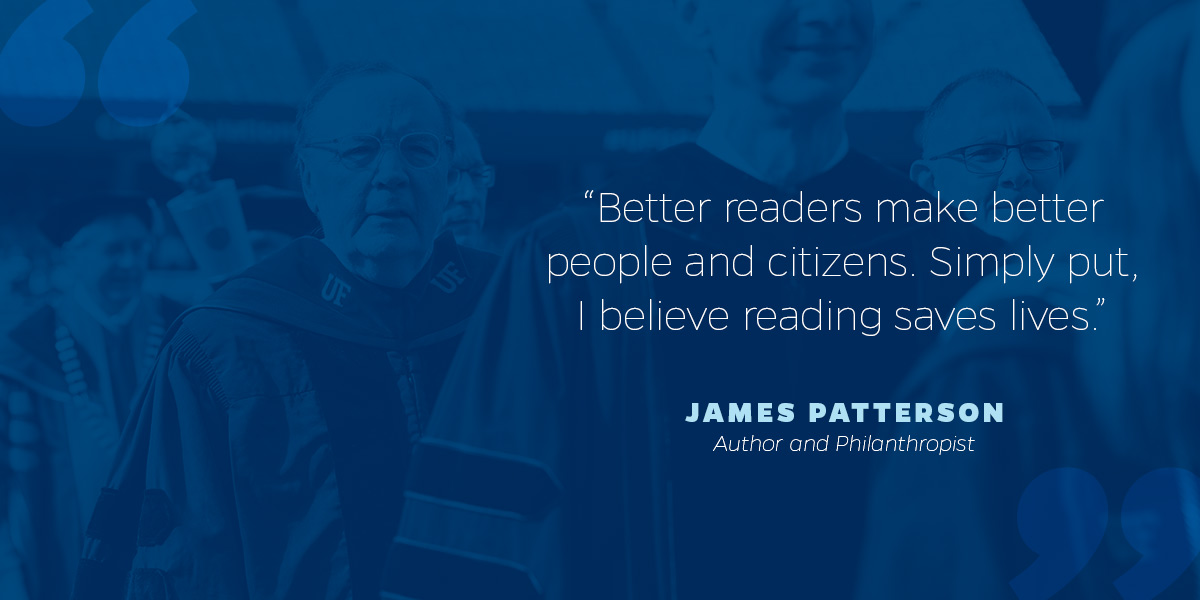GAINESVILLE, Fla. – At the Spring 2019 University-wide commencement ceremony, James Patterson, America’s best-selling author, offered a free story to attendees about him and his wife, Susan, and “The most important thing that we’re doing right now.” Spoiler alert: it involves the University of Florida and literacy.
In a sequel to his last gift, $3 million which established the James Patterson Literacy Challenge, the novelist and philanthropist has committed to an additional $4.5 million for phase two of the project aimed at doubling the number of children in Florida who can read proficiently.
The James Patterson Literacy Challenge collaborates with multiple entities, at UF and beyond, to provide the best possible opportunities for schools. Key partners at the university include the Lastinger Center for Learning, P.K. Yonge Developmental Research School and the University ofFlorida Literacy Institute.

“I consider this the best thing in the area of philanthropy that we are doing, because the ceiling is so high,” Patterson said, “We have 400 plus teacher scholarships throughout the country, which I hope makes a difference, but I’m so much more hopeful about our program with UF.”
Phase two includes three tiers, which progress from wide application to in-depth, in-person training:
- Tier 1: Bolstering the Literacy Matrix, an evidence-based, online professional development tool for teachers to learn the key concepts in reading
- Tier 2: Broadening professional development training to school- and district-based literacy coaches and administrators, and
- Tier 3: Expanding the reach of our targeted, school-based support to an additional 30-40 struggling schools
UF Education Dean Glenn Good said the college is grateful for the Patterson’s generous, continued support and that “helping students master reading is essential to their subsequent success in school, employment and society.”
The successful first phase of the project was built largely around in-depth, face-to-face literacy training for teachers from low-performing schools, including intensive professional development and coaching, as well as ongoing, on-site expert support for schools as they adopted UF’s evidence-based instructional methods.
More than 500 Florida educators from 18 schools across Alachua and Broward counties participated in a week-long Summer Academy that immersed them in the science of reading, learning how to implement evidence-based practices with support from expert facilitators.
The Summer Academy was followed up by individualized support from partnership facilitators designed to develop expertise in literacy among participating teachers.
“The feedback from teachers has been phenomenal,” said Holly Lane, associate professor of special education and director of the University of Florida Literacy Institute, “This is transformative professional development that puts evidence-based tools in the hands of the teachers who need them the most”
Pre- and post-testing demonstrated that teacher knowledge increased tremendously, and researcher observation revealed drastic changes in classroom practice in the pilot schools.
The overall reach and scope of the project was expanded through the implementation of the Literacy Matrix. In the pilot, 120 Florida educators from schools across 11 districts were immersed in in-depth educational modules that included support for assessment, instruction and intervention in key areas. Among participating students, 91 percent of the post-test scores were above the average of the pre-test scores. This fall, the full Literacy Matrix was launched with 500 teachers across the state.
About half of all new teachers in Florida begin their careers without any formal teacher preparation, and many veteran teachers were never taught evidence-based methods for supporting struggling readers. The team is ensuring that teachers across the state have the high quality professional learning opportunities they deserve. This is the critical nature of the James Patterson Literacy Challenge.
“With this phase of the project, we are able to extend our in-person training and provide tech-supported tools that will reach more teachers and benefit more students across the state,” Good said.
Thanks to this gift, the team will scale implementation to include as many districts and schools as possible, creating a statewide network of support for teachers and school leaders. This level of engaged effort in our Florida schools will continue to attract attention from national, regional, and community leaders who understand that reading proficiency and our nation’s future are intrinsically linked.
“Better readers make better people and citizens,” Patterson noted, “Simply put, I believe reading saves lives.”

SOURCE: Holly Lane, Ph.D., Professor and Director of the University of Florida Literacy Institute at UF’s College of Education; hlane@ufl.edu
SOURCE: James Patterson, 212-364-1181; c/o Erinn.McGrath@hbgusa.com
COMMUNICATIONS: Kevin Coulson, UF College of Education; kevincoulson@coe.ufl.edu; 352-273-4370






